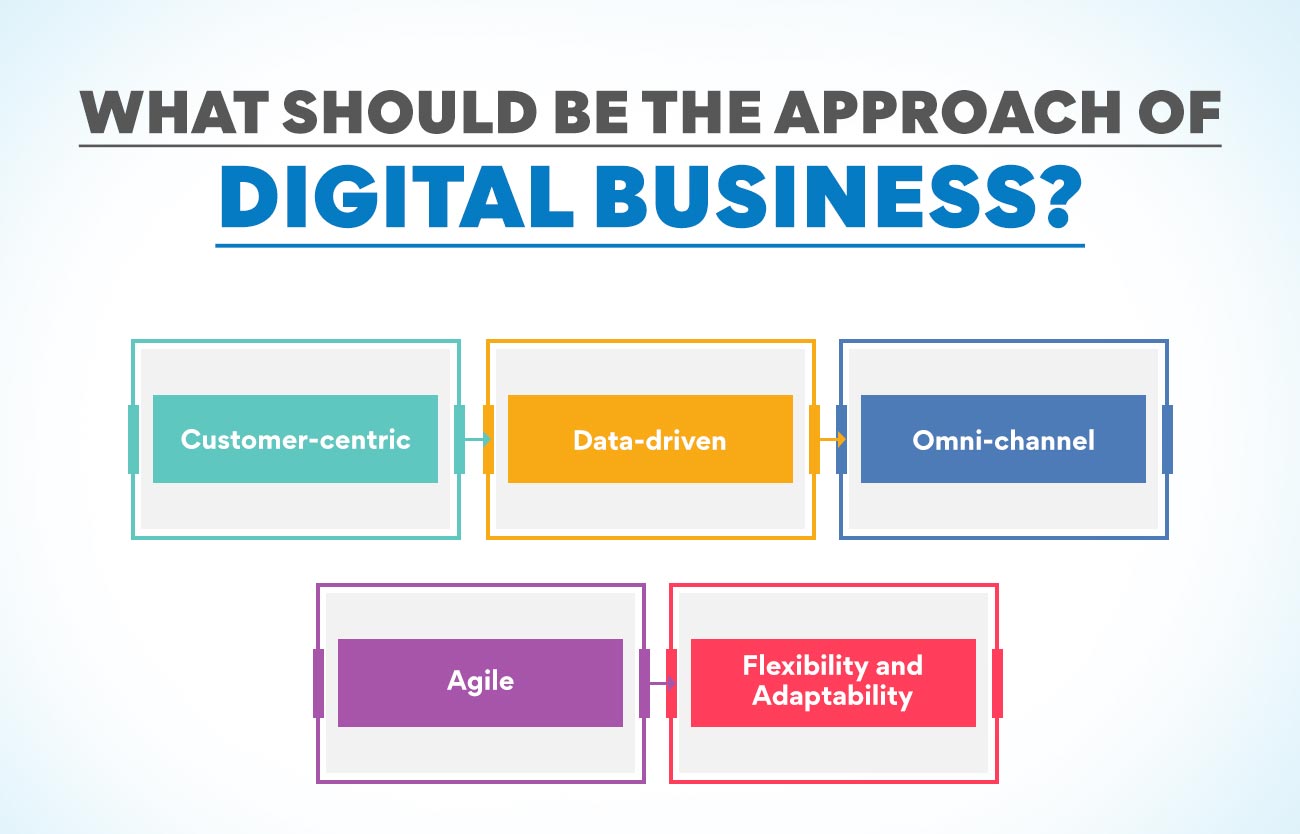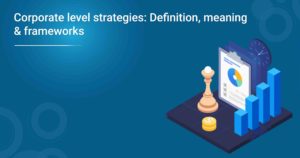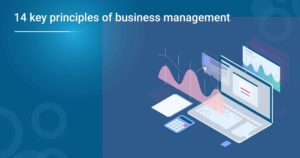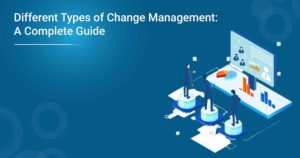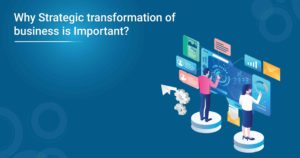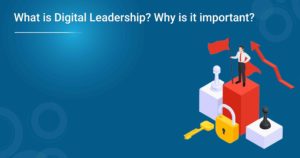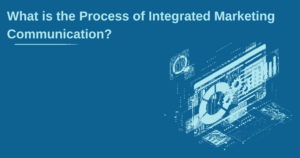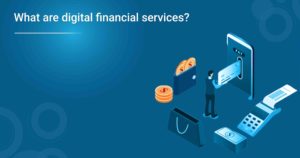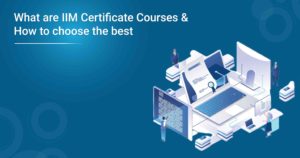In a digital world, almost everything can be done online. This has led to the rise of digital businesses – businesses that are operated primarily or entirely online. So what exactly is digital business? It is a term that is used to describe how businesses are conducted in the digital age. It encompasses all aspects of business, from marketing and sales to product development and operations. In this blog post, we will provide an introduction to digital business and discuss some of the key concepts that are involved.
What Is Digital Business?
Digital business uses digital technologies to create new or improved business processes, products, or services. It can also be defined as the application of digital technology in all aspects of a company’s operations, from product development and production to marketing and sales.
One key characteristic of digital businesses is that they are data-driven. That is, they rely on data to decide what to do next. This data can come from many sources, including customers, employees, and sensors.
Digital businesses are often able to move quickly and iterate rapidly. This is because they can use digital tools to test new ideas quickly and cheaply. For example, it might use a website or app to try a new feature with some users before launching it to the entire user base. They are also often global in nature. This is because they can reach customers anywhere in the world through digital channels such as the internet.
What Are The Benefits Of Digital Business In Today’s Ever-Evolving Business Realm?
The model has several advantages that make it appealing to businesses in today’s digital world.
- It is more agile and can adapt to change more quickly than a traditional business
The model relies on digital technologies, which are constantly changing and evolving. This means that a digital business can quickly adapt to market or customer needs changes.
On the other hand, traditional businesses often have rigid structures that make it difficult to change. It will lead them to be left behind when the market or customer needs change.
- It can reach a larger audience more efficiently than a traditional business
Traditional businesses are often limited to their local area. Digital businesses can use the internet to get customers all over the world. Reaching a larger audience can also help them to build up a loyal customer base and to find new markets for their products or services.
Digital businesses can also use social media and other digital channels to connect with their customers and build relationships. This is something that traditional businesses often struggle with.
- A digital business can save money on overheads
They often don’t need to rent office space or buy expensive equipment. This can save on other costs, such as advertising and marketing. It means that they can pass these savings on to their customers through lower prices.
Digital businesses also have lower running costs than traditional businesses. It is because they often don’t need to employ as many staff or to pay for expensive premises. They are, therefore, able to offer their products and services at a lower price than traditional businesses, which makes them more competitive.
- It can scale up more easily than a traditional business
This is because digital companies often don’t need to invest in new infrastructure or hire more staff as they grow. They can simply use their existing digital channels to reach more customers.
Traditional businesses often struggle to scale up because they need to invest in new premises, equipment, and staff. It can create a huge barrier to growth. Digital businesses are, therefore, able to grow more quickly and reach new markets more efficiently than traditional businesses.
What Is Digital Business Model?
The model is how a company sells its products or services online. This can be done through a website, app, or digital platform. The digital business model has transformed how many companies operate and created new opportunities for businesses to reach their customers.
There are many advantages of operating a digital business. One of the most significant advantages is that it allows businesses to reach a global audience. With it, there are no geographical boundaries. Businesses can reach out to their customers in any corner of the world.
Another advantage of a digital business is that it is usually much cheaper to operate than a traditional brick-and-mortar business. There are no physical store locations to maintain, and businesses can save on overhead costs such as rent, utilities, and staff.
The model also allows businesses to be more agile and responsive to change. With this, companies can quickly launch new products or services and make changes to their offerings with minimal cost and effort. This agility can give businesses a competitive advantage in the marketplace.
What Should Be The Approach Of Digital Business?
Customer-centric: The customer should be at the center of all activities, strategies, and processes. The customer’s needs and wants should be the primary focus in order to create value for them.
Data-driven: As data is the king. All the important decisions should be made based on data that has been collected and analyzed. This will help to make better decisions informed by customer behavior and trends.
Omni-channel: Providing a seamless experience for customers across all channels is essential. This means they should be able to move effortlessly between channels without losing any data or having a negative experience.
Agile: As agility is key, the ability to respond rapidly to market and customer needs changes is essential for success. Agility also allows for experimentation and innovation, which are necessary for growth.
Flexibility and Adaptability: It is essential to be flexible and adaptable. This means changing strategies, processes quickly, and even products or services to meet customers’ ever-changing needs.
What Are The Examples of Digital Business?
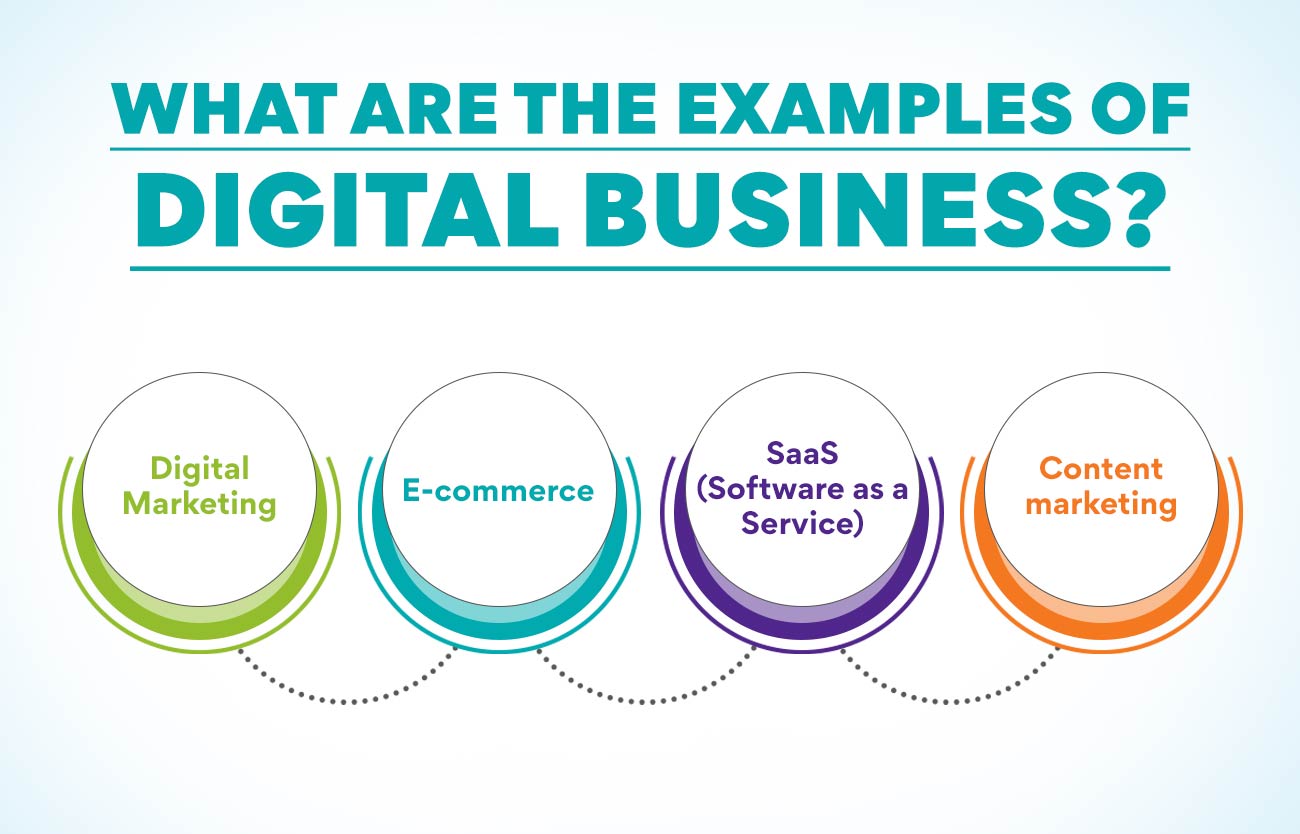
Digital business can take many different forms. Some common examples include:
Digital marketing: This encompasses all of the various digital channels that businesses can use to reach and engage their target audiences. This includes everything from social media marketing and content marketing to search engine optimization (SEO) and email marketing.
E-commerce: This is the most obvious form of the concept. E-commerce refers to any business that is conducted online. E-commerce ranges from selling physical products to digital services.
SaaS (Software as a Service): SaaS businesses provide software that is accessed and used online. This could be anything from productivity software to video editing tools.
Content marketing: Content marketing is a digital business strategy that involves creating and distributing valuable content to attract and retain customers. This could include blog posts, infographics, eBooks, etc.
Digital business is not limited to these examples. In fact, almost any type of business can be conducted digitally in some way. Identifying the digital channels that make the most sense for your business is essential, and focusing on using them effectively.
Essential Components Of Digital Business
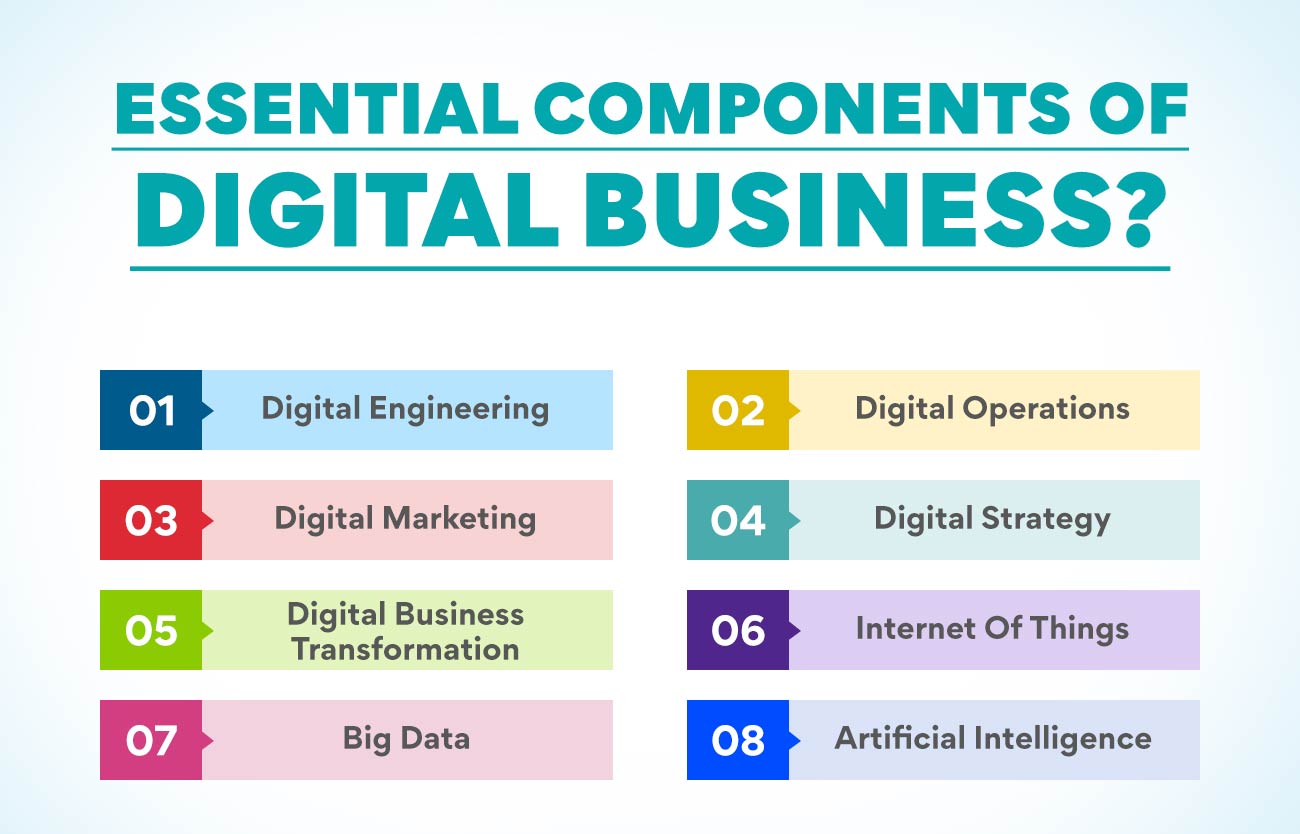
It is all about integrating digital technologies into core areas of a business, leading to fundamental changes in business operations. Here are the critical components of the concept:
Digital Engineering: The application of digital technologies to the design, development, and deploy products and services. It is the digital backbone of the model, and it is essential for creating a competitive advantage.
Digital Operations: The use of digital technologies to manage the end-to-end lifecycle of products and services, including the management of digital resources. It will help businesses achieve operational excellence and customer intimacy.
Digital Marketing: The use of digital technologies to engage customers and prospects, build relationships, and create value. It is the key to creating a digital customer experience.
Digital Strategy: The application of digital technologies to achieve business objectives. It is the foundation for creating the model.
Digital Business Transformation: The digital technologies used to create a new or different business model that delivers improved value to customers. It is the most important thing businesses can do to compete in the digital age.
Internet Of Things: The network of physical objects connected to the Internet and can collect, exchange, and act on data. It is a crucial enabler of digital business, and it has the potential to transform how businesses operate.
Big Data: The large volume of data that is being generated by digital devices and digital interactions. It is a crucial resource for digital business, and it can be used to create insights that drive competitive advantage.
Artificial Intelligence: Artificial intelligence can be used to automate and improve decision-making, and it is a pivotal enabler of digital business. It will help businesses create new experiences and services, and it will drive digital transformation.
Digital technologies are revolutionising how businesses function, and it is the future wave. Are you ready to ride the wave?
If you want to get started in digital business, check out our Advanced Executive Certificate in Digital Business Management. It’s an excellent resource for businesses that are just getting started in the digital age.
Digital Business Is The Way Forward
Digital business is the future. There’s no doubt about it. But what exactly is it? In its simplest terms, digital business is the use of digital technologies to create new or improved business processes, products, or services. It can include everything from automating manual processes to developing new digital products and services.
It is not just about technology, however. It’s also about people and culture. To be successful, digital businesses need to focus on creating a culture of innovation and continuous improvement. They must empower their employees to use digital technologies to be more productive, efficient, and effective.
The benefits of digital business are clear. By digitizing their operations, businesses can become more agile, efficient, and customer-centric. They can also tap into new markets and create new revenue streams.
However, making the transition can be challenging. Organizations must carefully consider their strategy, structure, processes, and culture. They also need to invest in the right digital technologies and skills.
But the rewards are worth it. By embracing the concept, organizations can stay ahead of the competition and thrive in the digital age.
Career Opportunities In Digital Business
It offers a variety of career opportunities for those with the right skill set. From digital marketing and web design to data analysis and cybersecurity, there are many ways to get involved in digital business.
The best way to start exploring digital business careers is to identify your skillset and interests. Once you know what you’re good at, you can begin researching digital business jobs that fit your criteria.
You must keep yourself updated about the landscape. There are numerous online resources and tools available to help you learn more about digital business. The more you know the intricacies, the better you will be able to find jobs that are right for you. It is also constantly evolving, so it’s crucial to stay up-to-date with the latest trends. Staying updated on the dynamic transformation will help you identify new opportunities and prepare you for the ever-changing business landscape.
Enroll in our Advanced Executive Certificate in Digital Business Management covers various digital business concepts and tools that will help you understand it in a better way.
With the help of this course, you will be able to develop a digital business strategy for your organization and drive digital transformation. If you want to flourish in the field and take your career to the next level, then this course is for you.






